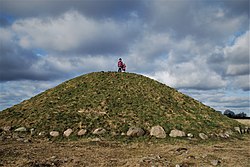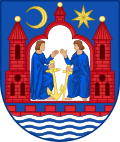Borum Eshøj
The village has an active community centered on the village hall, with amateur theatre, film club, choir, cooking, gymnastics, markets, etc.. Just south of Borum is the stream of Lyngbygård Å. The stream feeds Årslev Engsø and the Aarhus River and part of the river valley has recently been environmentally restored and reconstructed, with nature paths and trails.
Borum church

Borum church is placed on an elevation in the south west, overlooking the village. The older Romanesque parts of the small church is built from granite ashlar. There are several stone carved decorations and church frescos in the church. A 43 x 32 cm grey granite stone with a chiselled sun cross from the Bronze Age was discovered in the 1890s, when an associated stone dyke was dismantled. It has been in possession of the National Museum of Denmark since 1902.
Bronze Age burial mounds

North west of the village, towards the lake of Lading Sø, is an elevated plateau overlooking the surrounding landscape, with remains of several Bronze Age burial mounds (tumuli). The most famous is Borum Eshøj, containing 3 remarkably preserved oak coffins, with the skeletons of 2 men and a woman, wearing intact clothing, daggers, combs and other grave goods, from the 14th century BC (Nordic Bronze Age). It is formerly one of the largest long barrows in Denmark. First explored in the 1870s, it is now a protected cultural heritage site. There is also has a Bronze Age settlement with some replica houses.

References
- ^ BY3: Population 1. January, by urban areas The Mobile Statbank from Statistics Denmark
- ^ "Sporene i Lyngbygård Ådal" (PDF) (in Danish). Archived from the original (PDF) on 4 March 2016. Retrieved 1 September 2015. A pamphlet guide to Lyngbygård Å
- ^ Frost, Lise (2017). "Borum Eshøj Revisited – Bronze Age monumental burial traditions in eastern Jutland, Denmark". Danish Journal of Archaeology. 11 (1): 31–49.
Sources
- Local historical archives for the Borum and Lyngby parishes (in Danish)
- Official homepage for Borum (in Danish)
- Borum church National Museum of Denmark (in Danish) Summary in English
External links
56°06′42″N 10°00′15″E / 56.1118°N 10.0041°E
